A Tradition of Student Athletes that Are Scholars First
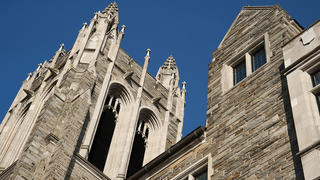
Editor's note: This article was written prior to University of the Sciences' merger with and into Saint Joseph's University and does not reflect the current, combined institution. References to programs, offices, colleges, employees, etc., may be historical information.
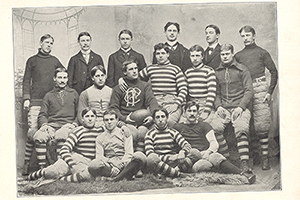 For more than 100 years, the University’s athletic programs have welcomed devoted student-athletes who pledge themselves to their sport of choice while simultaneously committing in the classrooms and labs to a rigorous and demanding education.
For more than 100 years, the University’s athletic programs have welcomed devoted student-athletes who pledge themselves to their sport of choice while simultaneously committing in the classrooms and labs to a rigorous and demanding education.
In 1896 then-Professor Joseph Remington suggested to the students that they begin a “gymnasium” to establish athletic teams for the college. The students raised $270 from alumni association, faculty, wholesale druggists, and some of their fellow classmates to establish a gym that went on to train the first football team representing the college in 1898.
By 1902 an athletic association was organized that the same year brought about the inaugural season of basketball at Philadelphia College of Pharmacy. The team produced a 5-4 record, including a game forfeited to the College by Medico Chi “on account of professionalism,” according to the 1902 yearbook. 1902 was also the first year that a track team was organized to compete at the University of Pennsylvania Relay races. In 1904, the first bowling team competed in the Wholesale Drug League, and in 1905 two baseball teams were established at PCP, they consolidated efforts in 1908.
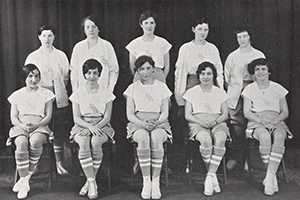 The first women’s team began in 1935, when a basketball team was organized. “Basketball practice started simply for recreation, but so many girls came out and there was such good spirit that a team was organized,” they wrote in the 1935 yearbook. While they played only two games that season, and were defeated in both, the team shared, “We are not in the least disappointed with this season since it is our first. We feel that it is a good start for a future girls’ basketball team at P.C.P. and S.”
The first women’s team began in 1935, when a basketball team was organized. “Basketball practice started simply for recreation, but so many girls came out and there was such good spirit that a team was organized,” they wrote in the 1935 yearbook. While they played only two games that season, and were defeated in both, the team shared, “We are not in the least disappointed with this season since it is our first. We feel that it is a good start for a future girls’ basketball team at P.C.P. and S.”
Originally funded through supporters who purchased “membership tickets” to the Athletic Association, the College’s Board of Trustees jumped into help fund athletics by 1910, equipping the teams, hiring coaches and helping in conditioning efforts.
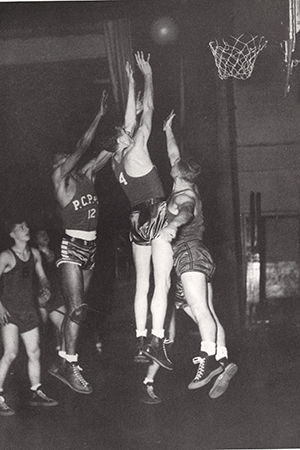 The football team’s record, “warranted the assertion that the Pharmacy boys would ‘clean ‘em all up’, according to a recounting in the 1899 year book. It went on to share that the team included a series of trick plays into their strategy including one known as “Pill Formation.” Despite the enthusiasm of the team, there is no record of the football team’s continuation past 1911.
The football team’s record, “warranted the assertion that the Pharmacy boys would ‘clean ‘em all up’, according to a recounting in the 1899 year book. It went on to share that the team included a series of trick plays into their strategy including one known as “Pill Formation.” Despite the enthusiasm of the team, there is no record of the football team’s continuation past 1911.
In a compilation of notes and results about PCP’s early athletics history is an item about the 1906 squad that reads, “No wins. Typhoid again.” Other illnesses and the World Wars prevented the College from even fielding teams for seven seasons during the first half of the 20th century. Pharmaceutical industry icon Robert L. McNeil, Jr., P’38, Hon DSc'70 played ball for a season during his time, an experience that helped launch his role as a lifelong booster of the University’s athletics program.
While several squads were competitive, the role of sports has always been a secondary one by design.
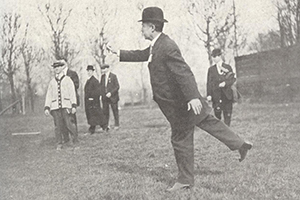 “The word student always comes first,” said athletic director Bobby Morgan, who notched a school-record 598 wins in his 31 years as head coach. “It is ‘student-athlete’ here. It isn’t ‘athlete-student.’ People look at us as a very good program at an institution that is very highly ranked academically.”
“The word student always comes first,” said athletic director Bobby Morgan, who notched a school-record 598 wins in his 31 years as head coach. “It is ‘student-athlete’ here. It isn’t ‘athlete-student.’ People look at us as a very good program at an institution that is very highly ranked academically.”
As members of small teams at a small school, former players cite the camaraderie they felt as a defining trait of the program, making a sport almost like a fraternity since it brought together individuals of similar interests and common goals. Others remark that the intense athletics schedule helped to make them better students, highlighting the importance of time management, communication, hard work, preparation and critical thinking.
Even today, USciences teams have won awards from their athletic conference acknowledging the academic achievements of the athletes on a regular basis.
“We are proud that our student-athletes have the opportunity to continue to play a sport they love and experience the collegiate level competition, but also that they have an opportunity to excel in rigorous academic programs and go on to great careers,” said Marc Caserio, athletic director.
